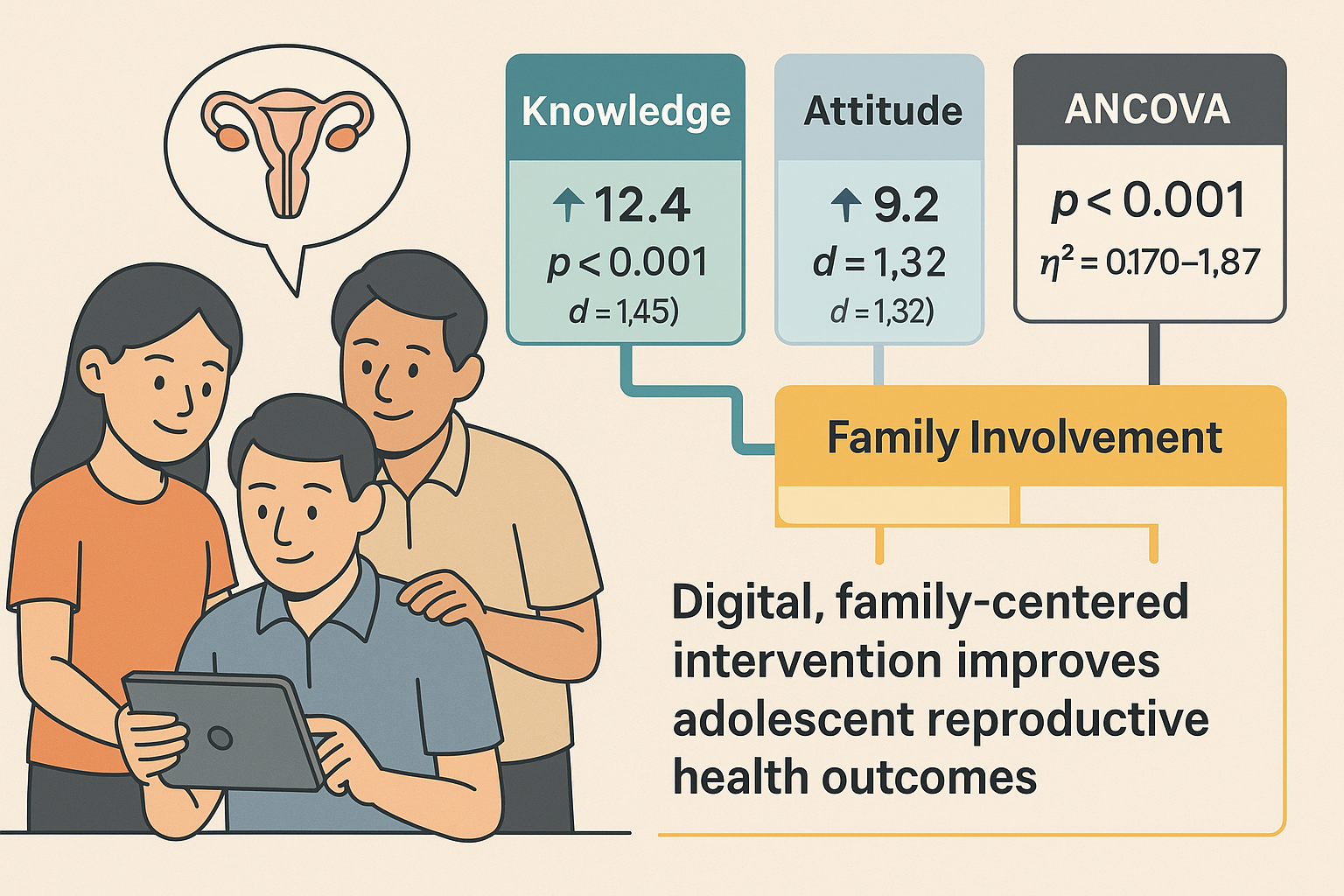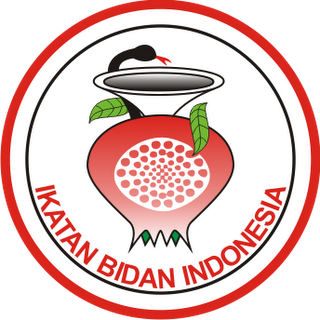Utilizing Digital Applications as Educational Media for Adolescent Reproductive Health Within The Family Nursing Approach
https://doi.org/10.33860/jbc.v7i1.4193
Keywords:
Adolescent health, Digital intervention, Family involvement, Health educationAbstract
Background: Adolescent reproductive health remains a major public health concern, particularly in developing regions. This study aimed to evaluate a digital, family-centered reproductive health education intervention to improve adolescents’ knowledge, attitudes, and family involvement.
Methods: A quasi-experimental pretest-posttest control group design was conducted in Cirebon, Indonesia, involving 120 adolescents. Variables included knowledge, attitudes, and family involvement. Instruments were validated questionnaires. Data were analyzed using descriptive statistics, paired t-tests, ANCOVA, and multiple linear regression. Effect sizes were reported using Cohen’s d and η².
Results: The intervention group (62.5% female, mean age 15.8 ± 1.2 years) showed significant improvements: knowledge (ΔM = +12.4, p < 0.001, d = 1.45), attitude (ΔM = +9.2, p < 0.001, d = 1.32), and family involvement (ΔM = +14.2, p < 0.001, d = 1.61). ANCOVA indicated significant between-group differences (p < 0.001) with large effect sizes (η² = 0.170–0.187).
Conclusion: A digital, family-centered education model effectively enhances adolescent reproductive health outcomes and offers a scalable intervention framework.
Downloads
References
Agu, O., Agu, I. C., Eigbiremolen, G., Akamike, I., Okeke, C., Mbachu, C., & Onwujekwe, O. (2024). Sexual and reproductive health information needs; an inquiry from the lens of in-school adolescents in Ebonyi State, Southeast Nigeria. BMC Public Health, 24(1). https://doi.org/10.1186/S12889-024-18584-W
Bergevi, J., Andermo, S., Woldamanuel, Y., Johansson, U. B., Hagströmer, M., & Rossen, J. (2022). User Perceptions of eHealth and mHealth Services Promoting Physical Activity and Healthy Diets: Systematic Review. JMIR Human Factors, 9(2). https://doi.org/10.2196/34278
Blakeslee, S. B., Vieler, K., Horak, I., Stritter, W., & Seifert, G. (2023). Planting Seeds for the Future: Scoping Review of Child Health Promotion Apps for Parents. JMIR MHealth and UHealth, 11. https://doi.org/10.2196/39929
Eppes, E. V., Augustyn, M., Gross, S. M., Vernon, P., Caulfield, L. E., & Paige, D. M. (2023). Engagement with and Acceptability of Digital Media Platforms for Use in Improving Health Behaviors among Vulnerable Families: Systematic Review. Journal of Medical Internet Research, 25. https://doi.org/10.2196/40934
Kementerian Kesehatan. (2018). files99053Pedoman Pelaksanaan PPAM Kespro Remaja Pada Krisis Kesehatan. Jakarta: Kementerian Kesehatan RI.
Garg, R. (2016, September 1). Methodology for research I. Indian Journal of Anaesthesia. Indian Society of Anaesthetists. https://doi.org/10.4103/0019-5049.190619
Ghosh, A., & Fouad, N. A. (2016). Family Influence on Careers Among Asian Parent–Child Dyads. Journal of Career Assessment, 24(2), 318–332. https://doi.org/10.1177/1069072715580417
Handayani, B., & Arianto, B. (2024). Promosi Kesehatan Era Digital. Borneo Novelty Publishing.
Hémono, R., Gatare, E., Kayitesi, L., Hunter, L. A., Packel, L., Ippoliti, N., … McCoy, S. I. (2024). Effect of a digital school-based intervention on adolescent family planning and reproductive health in Rwanda: a cluster-randomized trial. Nature Medicine, 30(11), 3121–3128. https://doi.org/10.1038/s41591-024-03205-1
Jena, S., Parida, J., Panda, A., Behera, S. S., Pradhan, A., Patra, P. K., … Acharya, S. K. (2023). Knowledge, practices and influencing factors defining unhealthy food behavior among adolescents in India: a scoping review. Frontiers in Psychology, 14. https://doi.org/10.3389/FPSYG.2023.1161319
Kantamneni, N., Dharmalingam, K., Orley, G., & Kanagasingam, S. K. (2018). Cultural Factors, Perceived Barriers, and Asian American Career Development: An Application of Social Cognitive Career Theory. Journal of Career Assessment, 26(4), 649–665. https://doi.org/10.1177/1069072717723097
kasmad, Marisa, D. E., & Kadafi, A. (2021). Koping keluarga tenaga kesehatan dalam menghadapi pandemik Covid-19 Kota Cirebon, 12(2). https://doi.org/10.38165/jk
Kemenkes. (2023). Profil Kesehatan Indonesia. Jakarta.
Kementerian Pemberdayaan Perempuan dan Perlindungan Anak. Retrieved 05/29/2025 from https://www.kemenpppa.go.id/page/view/NDU4MA==
Kim, S. Y., Ahn, T., & Fouad, N. (2016). Family Influence on Korean Students’ Career Decisions: A Social Cognitive Perspective. Journal of Career Assessment, 24(3), 513–526. https://doi.org/10.1177/1069072715599403
Lowe, M., Joof, M., & Rojas, B. M. (2024). Social and cultural factors perpetuating early marriage in rural gambia: An exploratory mixed methods study. F1000Research, 8, 1–17. https://doi.org/10.12688/f1000research.21076.1
Marisa, D. E. (2018). Support of Family to People Live with Hiv/ads (Plwha) in the Working Area of Kaliwedi Health CENTER in District of Cirebon. Journal.Mahardika.Ac.Id, 5(1), 57–63. https://doi.org/https://doi.org/10.54867/jkm.v5i1.37
Marisa, D. E., Dioso, R. I., Elengoe, A., & Kamasturyani, Y. (2025). Efforts to Increasing Hemoglobin Levels and Its Impact on Adolescent Girls Entering Pregnancy in Indonesia. African Journal of Biomedical Research, 28(1), 334–338. https://doi.org/10.53555/AJBR.v28i1S.3614
Marisa, D. E., Dioso, R. I., Elengoe, A., Kamasturyani, Y., & Iyos, R. (2025). Tackling Adolescent Anemia: A Systematic Review of Integrated Interventions. Al-Rafidain Journal of Medical Sciences, 8(1), 6–13. https://doi.org/10.54133/ajms.v8i1.1601
Marisa, D. E., Kasmad, & Purbasari, E. S. (2022). Emosi Remaja Putri yang Mengalami Dismenore di Wilayah Desa Rajawetan Kecamatan Pancalang Kabupaten Kuningan. Cerdika.Publikasiindonesia.Id. Retrieved from https://cerdika.publikasiindonesia.id/index.php/cerdika/article/view/413
Marlina, L., Marisa, D. E., & Nurlaili, L. (2022). Pengetahuan Dan Kepatuh an Penerapan Protokol Kesehatan Pada Pengunjung Praktik Mandiri Bidan Di Desa Rajagaluh Kidul. Jurnal Kesehatan Mahardika, 8(2), 39–44. https://doi.org/10.54867/jkm.v8i2.88
Mauch, C. E., Laws, R. A., Prichard, I., Maeder, A. J., Wycherley, T. P., & Golley, R. K. (2021). Commercially available apps to support healthy family meals: User testing of app utility, acceptability, and engagement. JMIR MHealth and UHealth, 9(5). https://doi.org/10.2196/22990
Michael, T. O. (2024). Exploring factors influencing sexual and reproductive health knowledge among in-school adolescents in Nigeria. Simulacra, 7(1), 137–150. https://doi.org/10.21107/SML.V7I1.25522
Mukherjee, S. Prasad. (2020). A Guide to Research Methodology : an Overview of Research Problems, Tasks and Methods. CRC Press.
Ndugga, P., Kwagala, B., Wandera, S. O., Kisaakye, P., Mbonye, M. K., & Ngabirano, F. (2023). “If your mother does not teach you, the world will…”: a qualitative study of parent-adolescent communication on sexual and reproductive health issues in Border districts of eastern Uganda. BMC Public Health, 23(1), 1–12. https://doi.org/10.1186/S12889-023-15562-6/TABLES/3
Nurhaeni, A., Erna Marisa, D., Oktiany, T., Rahayu, R., Sari Purbaningsih, E., Wahyuni Institut Teknologi dan Kesehatan Mahardika, L., & Terusan Sekar Kemuning No, J. (2025). Exploring the Relationship between Body Shaming and Self-Concept among Adolescents. Indonesian Journal of Global Health Research, 7(3), 879–888. https://doi.org/10.37287/IJGHR.V7I3.6264
Nurhaeni, A., Marisa, D. E., & Ocktiany, T. (2022). Peningkatan Pengetahuan Tentang Gangguan Kesehatan Mental pada Remaja. Download.Garuda.Kemdikbud.Go.Id. Retrieved from http://download.garuda.kemdikbud.go.id/article.php?article=3234124&val=28314&title=PENINGKATAN%20PENGETAHUAN%20TENTANG%20GANGGUAN%20KESEHATAN%20MENTAL%20PADA%20REMAJA
Pandey, Prabhat., & Pandey, M. Mishra. (2015). Research methodology : tools & techniques. Bridge Center.
Patel, M., & Patel, N. (2019). Exploring Research Methodology: Review Article. International Journal of Research & Review, 6(3), 48–55.
Purbaningsih, E. S., Muadi, & Marisa, D. E. (2025). Effectiveness Of Mindfulness Therapy In Reducing Anxiety Among Nursing Students: A Pre-Post Experimental Study. Journal of Neonatal Surgery, 14(6), 173–178. https://doi.org/10.52783/jns.v14.3064
Purbasari, D., Nurhaeni, A., Karlina, N., Setyo, C., Andhini, D., & Marisa, D. E. (2024). Analysis of Interactions and Psychosocial Responses in Children and Parents with Covid-19 During Quarantine/Isolation. Malaysian Journal of Medicine and Health Sciences, 20(6), 181–186. https://doi.org/10.47836/mjmhs20.6.24
Rahmiwati, A., Djokosujono, K., Krianto, T., Utari, D. M., Djuwita, R., Setiarini, A., … Mulyana, N. (2023). Effect of Local Culture-based Nutrition Education on Compliance with Iron and Folic Acid Supplementation in Female Adolescent. Kesmas, 18(2), 112–121. https://doi.org/10.21109/kesmas.v18i2.6832
Sauber, S., L’Abate, L., Weeks, G., & Buchanan, W. (2014). The Dictionary of Family Psychology and Family Therapy. The Dictionary of Family Psychology and Family Therapy. SAGE Publications, Inc. https://doi.org/10.4135/9781483326573
Skeens, M. A., Kochashvili, M., Benhayoun, A., Ralph, J., Bajwa, R., Vannatta, K., … Sezgin, E. (2024). Enhancing medication adherence: A family-centered co-designed mHealth app for children undergoing hematopoietic stem cell transplant. Journal of Pediatric Nursing, 79, e132–e140. https://doi.org/10.1016/j.pedn.2024.10.009
Sugiyono. (2018). Metode Penelitian Kuantitatif, Kualitatif, dan R&D. Bandung: Alfabeta.
Tiwari, A., Wu, W. J., Citrin, D., Bhatta, A., Bogati, B., Halliday, S., … Maru, S. (2022). “Our mothers do not tell us”: a qualitative study of adolescent girls’ perspectives on sexual and reproductive health in rural Nepal. Sexual and Reproductive Health Matters, 29(2). https://doi.org/10.1080/26410397.2022.2068211
Tran, S., Smith, L., El-Den, S., & Carter, S. (2022). Th e Use of Gamification and Incentives in Mobile Health Apps to Improve Medication Adherence: Scoping Review. JMIR MHealth and UHealth, 10(2). https://doi.org/10.2196/30671
UNESCO, U. U. U. (United N. C. F. U. W. (United N. E. for G. E. and the E. of W. and W. (2018). International Technical gGuidance on Sexuality Education: An Evidence-informed Approach, Revised Edition. UNESCO, Paris.
Vautero, J., Taveira, M. do C., Silva, A. D., & Fouad, N. A. (2021). Family Influence on Academic and Life Satisfaction: A Social Cognitive Perspective. Journal of Career Development, 48(6), 817–830. https://doi.org/10.1177/0894845320902270
Vongsavanh, V., Lan, V. T. H., & Sychareun, V. (2020). Sexual and reproductive health communication between parents and high school adolescents in Vientiane Prefecture, Lao PDR. Global Health Action, 13(Suppl 2), 1785145. https://doi.org/10.1080/16549716.2020.1785145
WHO. (2022). WHO launches first ever global report on infection prevention and control. Retrieved 12/21/2022 from https://www.who.int/news/item/06-05-2022-who-launches-first-ever-global-report-on-infection-prevention-and-control
Zhang, L., Gong, R. L., Han, Q. R., Shi, Y. Q., Jia, Q. A., Xu, S. D., … Zhu, C. C. (2014). Survey of knowledge, attitude, and practice regarding reproductive health among urban men in China: a descriptive study. Asian Journal of Andrology, 17(2), 309. https://doi.org/10.4103/1008-682X.142139

Downloads
Published
How to Cite
Issue
Section
License
Copyright (c) 2025 Ani Nurhaeni, Rosalia Rahayu, Thia Oktiany, Endah Sari Purbaningsih, Lili Wahyuni, Dewi Erna Marisa (Author)

This work is licensed under a Creative Commons Attribution-ShareAlike 4.0 International License.
Authors who publish with Jurnal Bidan Cerdas agree to the following terms:
- Authors retain copyright and grant the journal right of first publication with the work simultaneously licensed under a Creative Commons Attribution License (CC BY-SA 4.0) that allows others to share the work with an acknowledgment of the work's authorship and initial publication in this journal.
- Authors are able to enter into separate, additional contractual arrangements for the non-exclusive distribution of the journal's published version of the work (e.g., post it to an institutional repository or publish it in a book), with an acknowledgment of its initial publication in this journal.
- Authors are permitted and encouraged to post their work online (e.g., in institutional repositories or on their website) prior to and during the submission process, as it can lead to productive exchanges, as well as earlier and greater citation of published work.

This work is licensed under a Creative Commons Attribution-Share Alike 4.0 International License
You are free to:
- Share, copy and redistribute the material in any medium or format
- Adapt, remix, transform, and build upon the material for any purpose, even commercially.
- The licensor cannot revoke these freedoms as long as you follow the license terms.




